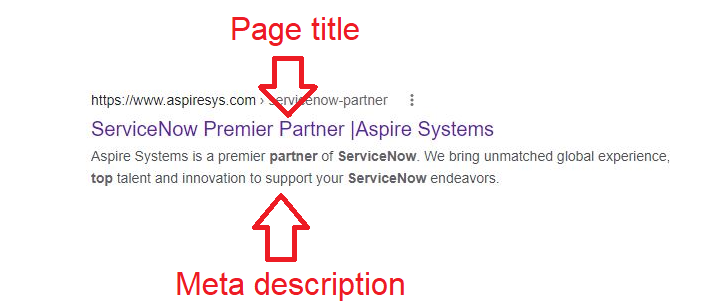Search engine optimization (SEO) is the process of tweaking front-end and back-end components of your website to improve its ranking in search results to drive more traffic to your site.
The more optimized your site is, the more prominently it will appear in search results for various keywords.
Let’s look at a few of the key elements of SEO and showcase how partner businesses within the ServiceNow ecosystem are using best practice techniques to boost traffic to their sites.
Publish high quality web content
The number one tip when it comes to SEO: publish quality content on your website that your target audience – in our case, ServiceNow users and potential users – will find valuable.
Publish content that addresses the problems your audience is looking to solve. Each ServiceNow partner has a different solution focus, so create content that highlights your business’s unique value proposition. If you specialize in GRC and SecOps, produce content that people looking for a risk solution will find valuable.
SEO isn’t about stuffing your pages full of the keywords you think searchers are going to type into Google. Today, effective search (and effective SEO) is about solving for users’ INTENT. Search engines reward those sites that deliver what searchers are looking for, not those that simply string together arbitrary words and phrases.
Make sure your content includes engaging and relevant visual elements. Again, visual content is appealing both to site visitors and Google’s algorithms.
If you're looking for some ideas and inspiration, here are some of the pure play ServiceNow partners publishing great content:
Structure your site around topic clusters
With search having moved beyond keywords, search engines now look for clusters of content organized under a topic structure to help determine how influential a website is.
Here’s a short (1½-minute) video explaining the SEO benefits of this ‘topic clusters’ approach to website content architecture:
As a ServiceNow partner, organizing your site around topic clusters can be a powerful content strategy to help establish and grow search authority for your specific niche in the ecosystem.
Check out how Elite partner Plat4mation has used the topic cluster approach to create an authoritative page that ranks highly in the Google search results for the keyword ‘ServiceNow partner’.
The good news is that it’s easy to organize your sites content into topic clusters if you’re using HubSpot.
Make use of internal linking
Following on from topic clustering, another SEO tip relating to your site’s content is to ensure you implement internal linking. This is where content on one of your pages includes links that lead visitors to another page on your site. The aim is to help guide visitors from one piece of information to the next. The more you link to a specific page, the more important it looks to search engines.
In the context of educating site visitors about ServiceNow, internal linking could involve linking between pages that each showcase your company’s expertise in various product lines.
Don’t neglect page titles and meta descriptions
Webpage titles, also known as title tags, are an important component of SEO. They tell search engines, and humans, what each page is about, so make sure you have clearly written, relevant titles and meta descriptions.
Include keywords in your title and keep them to under 70 characters.

A meta description is the text that shows up right underneath the title in a search engine results page, meaning it can have a significant influence on whether someone clicks onto your site or not. Meta descriptions can also appear as the descriptor of a page when it’s shared on social media.
A meta description should begin to explain what someone might see if they click through to the page, but not give them the entire picture so they're left wanting to visit the page to find out more.
Keep meta descriptions to under about 155 characters (otherwise they’ll be partially truncated in the search engine results listing, losing some of their impact).
Dive deeper into SEO
While important, the elements covered above are by no means all there is to SEO.
For a detailed look at what else is involved, check out HubSpot’s Ultimate Guide to On-Page SEO.
There’s also off-page SEO to consider – the equally important practice of optimizing other aspects of a website that don’t relate to publishing or updating content.
Need Help with Your Content Strategy and SEO?
A successful digital marketing strategy for ServiceNow implementation services involves defining a clear message and a targeted approach to engaging with your prospects.
Our ServiceNow expertise means Think Points is ideally positioned to help you develop a powerful marketing strategy attuned to the unique solutions you bring to the ServiceNow partner ecosystem.
Our content roadmapping service can help with SEO and other aspects of your content-based marketing strategy.